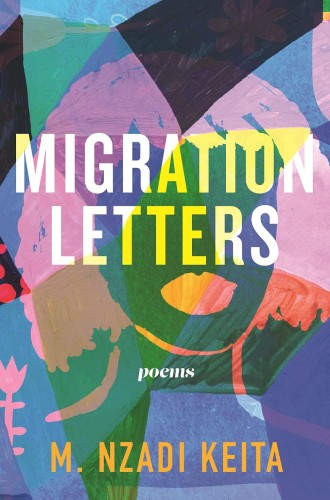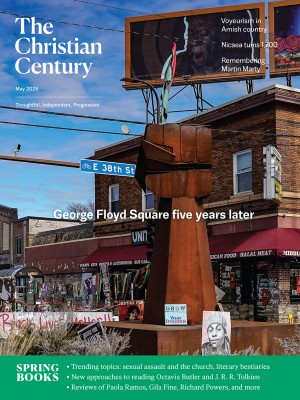Nzadi Keita’s poems about a “first gen North-born” Black woman
Keita has written a stunning collection about growing up in a working-class Black family in 1960s Philadelphia.

Migration Letters
Poems
During the Great Migration, from 1916 to 1970, millions of poor Black people left the South for a better life in the North. Philadelphia, for example, saw a 500 percent increase in its Black population in these years. But unlike other migrant groups, Black Americans did not assimilate and were victimized by prevailing racism. These historical truths energize Nzadi Keita’s stunning new collection of poems about a “first gen North-born” young woman raised in a working-class Black family in Philadelphia in the time of civil rights and the Black Power movement. Though she was born in Philly, the South still stayed with her, “another country you cannot see / a country you recognize by smell and inflection” as it did for some Black people who “will always wake up inside” a “Southern country.” It was a “South of troubled sleep left on pillows by instinct.”
But Keita’s poems are much more than geographic landmarks; they are memoirs of the “inside self” and “severed dreams” of a young Black woman and her generation struggling to claim their identity:
what if I see myself
scrap iron waiting for a red lightthe world passing me by
without comment
The 55 poems in Migration Letters play a medley of soul—musical riffs, lyrical fragments, surrealistic exclamations, frightening monologues, and testimonials of perseverance in the face of prejudice.
Above all they are “an inventory over time” of the artifacts, food, music, clothes, working conditions, and symbols of Black culture in White Philadelphia. Here are a few intentionally unpunctuated stanzas from a longer Black litany:
Read our latest issue or browse back issues.
Nat King Cole Lawd Ha’mercy fresh trout Fats Domino
Saltpork dishcloths Ivory Soap electric storm Crisco
Checkers Peanuts Dr. King Posner’s Um-Um-Um
Stay in prayer Adam Clayton Power Bennett College talcum
. . . . . . . . . . . . . . . . . . . . . . . . . . . . . . . . . . . . . . . . . . . . . . . . . .
clothesline Dinah Washington Fish fry Camay
Press-n-curl down home Miz Nettie Harry Belafonte
Keita’s poems honor other Black artists, including musicians like Chaka Khan, Pharoah Sanders, Jimi Hendrix, Johnny Mathis, Nina Simone, and Stevie Wonder and writers such as Sonia Sanchez, Toni Morrison, and Lorraine Hansberry. In fact, Keita includes four poems spoken by major characters in Hansberry’s play A Raisin in the Sun, which was adapted into one of the most important films about Black migration.
The horrors of prejudice scream out in these poems. “Rituals [were] designed to keep your brown / world inside its seams and creases.” In school, “Dark was supposed to mean dumb,” and if a Black student had “the nerve” to “outspell” a teacher’s “best stars,” the teacher would “find and punish the stupid part.”
Memories of the bombing at the 16th Street Baptist Church in Birmingham, Alabama, “would unleash dogs—wild nightmares.” When James Chaney’s name was heard on television, “a choke knot shrunk the dining room.” Medgar Evers’s blood, “thick as engine oil, too much for paper towels—soaked a whole block of that driveway, steps from the house.” Pictures of the Pettus Bridge “pitched you into some nameless road’s haunted edge . . . the torn throat of a staircase.” Poems excoriate uppity, “tassel” White people “speaking paper English” as well as the “faintly Black” who deride their darker sisters.
The church also receives censure:
You should have whatever
good whatever God sent. . .
No Sunday bombs. No queasy
quiet. No fire-spitting teachers.
The young Black woman wanted her grandmother to see her in the sanctuary and “to run to her Hershey-sweet brown arms” and receive a “coconut rabbit cake on a jelly-bean platter; every year under the / buttery, elsewhere eyes of white Jesus.” Philadelphia had
great
stone churches you will buy, nickels at a time, once
the white people sell cheap, and flee
to green valleys, past the city
line. Safe for them.
In a trio of poems on “Our Day Will Come,” you “pray heat and rent and roof.” And then “Freeze / white danger behind your teeth.”
“Invisibly proud” Black women courageously emerge as heroes for their strength and perseverance. Their ancestors heard when “the train’s call / groans like an answer.” They planted the seeds of migration. They “wish for wings,” but as a result of “bending washing / standing and ironing” as their bosom “swings / like a rosary / planting secret screams,” their wings “grow weary.” But they continue the “pendulum / of female motion / [that] keeps the coin jar full.” A poem on “Jones Beauty Shop” celebrates Black patrons who teach the “jovial, ministerial, entrepreneurial.” They have
Laughter like they cook it
educates you in sounds
almost worth the torture-turns
of a press-n-curl.
Keita merits a place among such experimental Black poets and dramatists as Ntozake Shange, Adrienne Kennedy, Suzan-Lori Parks, and Danez Smith. Sonia Sanchez, who has been instrumental in the Black arts movement, declares that Keita’s “poems breathe air.” They also sing, testify, and illuminate the influence of Black women migrating their way to victory.






